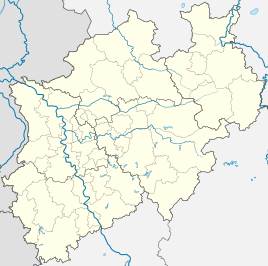Herzebocholt
|
Herzebocholt
City of Isselburg
Coordinates: 51 ° 49 ′ 48 ″ N , 6 ° 29 ′ 31 ″ E
|
||
|---|---|---|
| Area : | 7.4 km² | |
| Residents : | 255 (December 31, 2010) | |
| Population density : | 34 inhabitants / km² | |
| Incorporation : | 1st January 1975 | |
| Postal code : | 46419 | |
| Area code : | 02874 | |
|
Location of Herzebocholt in North Rhine-Westphalia |
||
Herzebocholt is a district of the town of Isselburg in the Borken district in North Rhine-Westphalia . Until 1974, Herzebocholt was an independent municipality .
geography
Herzebocholt covers the eastern part of the Isselburg city area and is a predominantly agricultural scattered settlement. A small settlement core has formed in the district of Schüttenstein. The former municipality of Herzebocholt had an area of 7.4 km².
history
Herzebocholt is an old Westphalian farming community . Since the 19th century, Herzebocholt formed a rural community in the Liedern department (from 1937 Liedern-Werth department ) in the Borken district . On January 1, 1975, Herzebocholt, which was until then the westernmost municipality in Westphalia, was incorporated into the city of Isselburg by the Münster / Hamm law .
Population development
| year | Residents | source |
|---|---|---|
| 1818 | 268 | |
| 1858 | 245 | |
| 1871 | 240 | |
| 1885 | 282 | |
| 1910 | 303 | |
| 1925 | 283 | |
| 1939 | 326 | |
| 1950 | 426 | |
| 1974 | 345 | |
| 2010 | 255 |
Architectural monuments
The Chapel of the Holy Trinity is a listed building .
Culture
The citizen rifle club Herzebocholt is a bearer of local customs .
Individual evidence
- ↑ a b Information about the city of Isselburg
- ^ A b c Hans-Walter Pries: Herzebocholt. In: HIS-Data. Retrieved May 11, 2019 .
- ↑ a b GenWiki: Herzebocholt
- ↑ Official Journal for the Münster administrative region, 1844, page 306. Retrieved on May 3, 2019 .
- ↑ Statistical news about the government district of Münster, 1860
- ↑ 1871 census
- ^ Community encyclopedia for the province of Westphalia 1885
- ↑ Uli Schubert: German municipality register 1910. Retrieved on February 2, 2017 .
- ^ A b Michael Rademacher: German administrative history from the unification of the empire in 1871 to the reunification in 1990. borken.html. (Online material for the dissertation, Osnabrück 2006).
